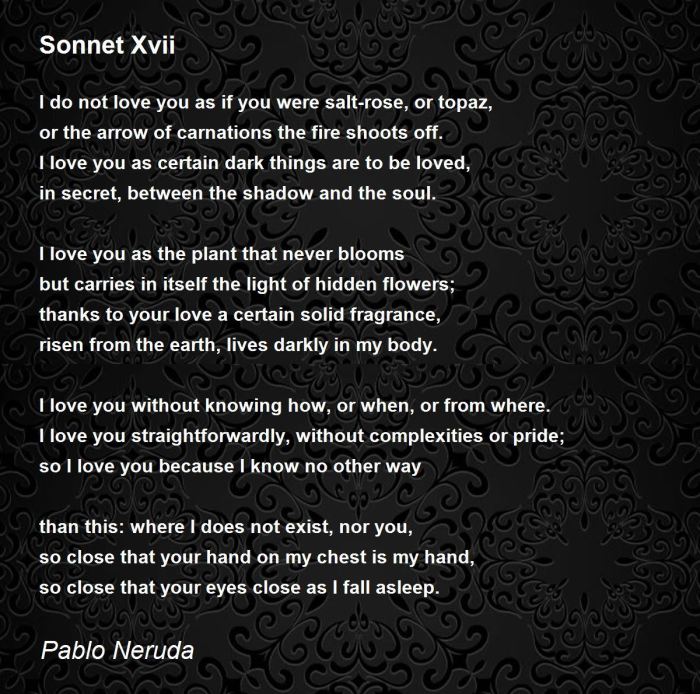Poem 20 pablo neruda english – Pablo Neruda’s “Poem 20,” an exquisite masterpiece from his collection “Twenty Love Poems and a Song of Despair,” invites readers to delve into the depths of love, longing, and the poignant ache of loss. Neruda’s evocative imagery and profound insights have made this poem an enduring classic, captivating hearts across generations.
Neruda’s journey through the complexities of human emotion is both deeply personal and universally relatable. “Poem 20” stands as a testament to the enduring power of love, its ability to both elevate and shatter the soul, and the profound impact it leaves upon our lives.
Introduction

Pablo Neruda, renowned for his exquisite and evocative poetry, left an indelible mark on the literary world. His profound insights into love, loss, and the human condition continue to resonate with readers worldwide.Born in Chile in 1904, Neruda’s literary career spanned over five decades, during which he published numerous acclaimed works, including “Twenty Love Poems and a Song of Despair” (1924). Among his most celebrated poems is number 20, which encapsulates the essence of his poetic brilliance.
Analysis of Poem 20
Pablo Neruda’s Poem 20 is a captivating exploration of love, desire, and the transformative power of nature. The poem is structured in a series of short, free verse stanzas, each of which captures a different aspect of the speaker’s emotional journey.
Central Themes
The central themes of Poem 20 include:* The transformative power of love:The speaker describes how love has the ability to awaken and rejuvenate the soul, bringing new life and purpose to existence.
The fusion of lovers
The speaker explores the idea of two lovers becoming one, both physically and emotionally, creating a new and unique entity.
The cyclical nature of love
The poem suggests that love is a cyclical process, with moments of passion and intimacy followed by periods of separation and longing.
Imagery and Symbolism
Neruda uses a wealth of imagery and symbolism to convey the themes of the poem. For example, the image of the “burning forest” represents the speaker’s intense passion for his lover, while the “river of tears” symbolizes the pain and longing that accompanies separation.
Structure and Form
The poem is written in a free verse style, with no regular meter or rhyme scheme. This allows Neruda to focus on the emotional content of the poem, rather than on its formal structure. The short, fragmented stanzas create a sense of urgency and immediacy, reflecting the speaker’s passionate and tumultuous emotions.
Poetic Techniques: Poem 20 Pablo Neruda English
Neruda’s use of poetic techniques in “Poem 20” enhances the poem’s imagery, rhythm, and emotional impact.
Poem 20 by Pablo Neruda is a passionate expression of love and longing. It captures the intensity of emotions and the desire for connection. As Carroll Izard, a psychologist, suggests in his work on emotions , love is a multifaceted experience that encompasses joy, excitement, and a deep sense of attachment.
Poem 20 by Pablo Neruda beautifully articulates these complexities, showcasing the transformative power of love and its ability to consume and inspire.
Metaphor and Simile
Neruda employs metaphors and similes to create vivid comparisons that deepen the poem’s meaning. For instance, he describes the woman’s body as “a white lake of lilies,” evoking a sense of purity and tranquility. Similarly, he compares her hair to “a black river of night,” suggesting its abundance and mystery.
Enjambment
Neruda frequently uses enjambment, where sentences flow across line breaks. This technique creates a sense of continuity and momentum, enhancing the poem’s rhythm. For example, the lines “Your breasts are like small hills/ lost in the distance” are enjambed, creating a smooth transition between the two images.
Alliteration and Assonance
Neruda also incorporates alliteration and assonance to create a musical effect. Alliteration, such as “white lake of lilies,” adds a pleasing sound to the poem. Assonance, such as “a black river of night,” creates a sense of harmony and flow.
Interpretation
Pablo Neruda’s Poem 20 offers multiple layers of interpretation. It can be seen as a:
Love Poem
The poem expresses the speaker’s intense desire and passion for his beloved. The speaker’s emotions are raw and unbridled, revealing a deep and consuming love.
Ode to Nature
The poem also celebrates the beauty and power of nature. The speaker describes the natural world in vivid imagery, portraying it as a source of inspiration and wonder.
Reflection on Mortality
Beneath the surface of love and nature, the poem hints at the inevitability of death. The speaker’s urgency to express his love suggests a sense of time running out.
Relevance to Contemporary Society
Poem 20 remains relevant today as it explores timeless themes of love, loss, and the human experience. It reminds us of the importance of cherishing our loved ones and appreciating the beauty of the natural world while we have it.
Emotional Impact on Readers, Poem 20 pablo neruda english
The poem’s passionate and evocative language has a profound emotional impact on readers. It stirs feelings of longing, desire, and a deep connection to the human condition.
Comparison to Other Works

Neruda’s Poem 20 stands as a testament to his unique poetic voice, showcasing similarities and differences with his other works and the broader landscape of love poetry.
Similarities to Neruda’s Other Works
Poem 20 shares several characteristics with Neruda’s other poems:
- Lyrical Expression:Neruda’s mastery of language is evident in the poem’s musicality and evocative imagery.
- Exploration of Love:Love remains a central theme throughout Neruda’s works, and Poem 20 delves into its complexities and intensity.
- Surrealist Elements:Neruda often incorporated surrealist techniques, which are also present in Poem 20’s dreamlike imagery and unconventional metaphors.
Differences from Other Love Poems
While Poem 20 shares common ground with other love poems, it also stands apart in several ways:
- Unconventional Perspective:Unlike traditional love poems that idealize the beloved, Poem 20 presents a more complex and realistic portrayal of love.
- Intensity and Passion:Neruda’s passionate and uninhibited language sets Poem 20 apart from more restrained love poetry.
- Absence of Romantic Clichés:Neruda avoids conventional romantic tropes and instead creates a unique and authentic expression of love.
Place within 20th-Century Poetry
Poem 20 occupies a significant place within the broader context of 20th-century poetry:
- Modernist Movement:The poem reflects the modernist emphasis on fragmentation, subjectivity, and experimentation.
- Surrealism:Poem 20’s surrealist elements align with the movement’s exploration of the subconscious and the irrational.
- Influence on Latin American Poetry:Neruda’s work, including Poem 20, had a profound impact on Latin American poetry and inspired generations of poets.
FAQ Section
What is the central theme of “Poem 20” by Pablo Neruda?
The central theme of “Poem 20” is the exploration of love’s complexities, its transformative power, and the profound impact it has on the human experience.
How does Neruda use imagery and symbolism in “Poem 20”?
Neruda employs vivid imagery and powerful symbolism to convey the emotions and experiences of love and loss. For instance, he uses the image of a “solitary boat” to symbolize the isolated and melancholic state of the speaker after losing love.
What is the significance of the repetition in “Poem 20”?
Neruda’s use of repetition, particularly in the refrain “I love you,” emphasizes the intensity and persistence of the speaker’s love. It also creates a sense of rhythm and incantation, enhancing the emotional impact of the poem.